Six hours and 40 minutes. That’s the time spent online per day by the average American. It’s no surprise that more brands want to establish and scale their online presence. An ever-rising number of advertising agencies in the US is proof of this.
This surge in interest has led to a rise in advertising agencies in the US, all aiming to harness the power of social media marketing. As an agency or marketer, understanding the nuances of social media campaign management is crucial.
This guide to social media campaign management will provide insights into how you can effectively engage with customers at their most relevant and natural touchpoints.
Let’s begin by understanding…
Why Are Social Media Campaigns Required?
Social media campaigns grant you a level playing field to compete in a space where your customers are most active and your competitors are already present.
As a social media marketing agency, you’re already familiar with leveraging social platforms to create digital brands for your clients, promote their products/services, or reinforce brand identity, all tailored to their specific objectives. To be effective, these campaigns must be aligned with the business goals of your clients.
Read on to learn about the impact social media campaigns have on businesses.
How Do Social Media Campaigns Impact Businesses?
Social media campaigns further the goals of brand awareness, lead generation, community engagement, and competitor analysis. Regardless of their size or life cycle stage, businesses can achieve their unique goals through social media campaigns.
What does this mean for your agency?
As an agency working to further the overarching business objectives of such organizations, you can design social campaigns that address some or all of the following goals:
1. Increase Reach
As a marketer, you’re no stranger to the challenge of attracting customers to your offering. You could have the most superior product or service, with the most nifty packaging and designs, but ensuring these offerings reach the right audience?
That’s where things get tricky.
With the right social media campaigns, you can increase brand visibility for your clients and reach the people who matter to their business.
Dove’s recent campaign ‘The Real Cost of Beauty’ is an excellent example of this.
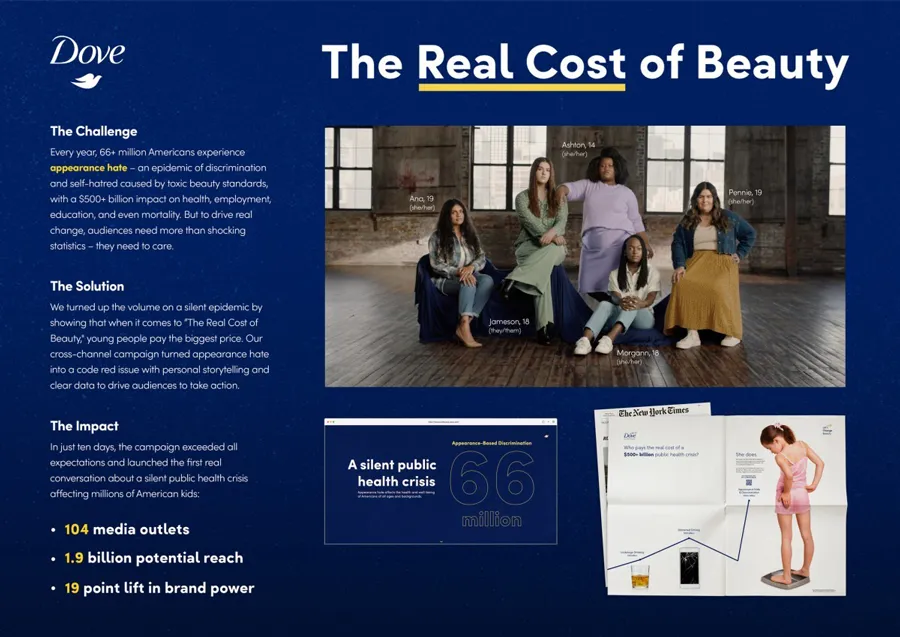
In light of the increasing focus on mental health, especially for young people around the world, Dove created this impactful campaign to start the conversation about the actual price of beauty, not the monetary price of purchasing products, but the harm that toxic and unrealistic beauty expectations subject young girls and women to.
Not only did this campaign ignite important conversations about the damage that upholding such beauty standards has on society, but it also enhanced brand visibility for Dove. It positioned Dove as a brand that truly cares about their consumers’ mental and physical well-being.
2. Build and Scale Brands
By adeptly leveraging social platforms frequented by your target audiences, you can curate and share content that resonates deeply with them.
Social media campaigns allow you to showcase the personality behind your business and humanize what can otherwise seem like yet another faceless organization.
It is human nature to share what we find value in.
Creating shareable content is the key to building brand awareness and establishing your brand in a highly competitive market. Spotify did this well with ‘Wrapped,’ which started in 2017, and 30 million Spotify users accessed Wrapped.
This personalized, interactive user experience that included fun, shareable elements for music fans to explore led them to post their year-end Wrapped to social media and compare with their friends, adding to the brand’s reach and visibility. Spotify witnessed a whopping 120 million users do this in 2022.

The more users see your brand and become familiar with it, the better your vantage point when you decide to scale up and move to social selling. It follows that consistency in these efforts gives you an avenue for trust-building with your audience and encourages them to buy from you when they are in the consideration stage of the funnel.
3. Strengthen Customer Insights
Social media campaigns offer a unique opportunity to get to know your customers better.
What’s more?
They offer an unparalleled opportunity to observe your target audience in their preferred digital spaces and have a finger on the pulse of how things are changing.
By that, we mean how they think, what their interests and needs are, and over time, predict their buying behavior.
See how KFC leveraged the universal human experience of straggling through the morning hours to make breakfast decisions.

This campaign was a non-traditional take on the usual marketing efforts expected from companies of this magnitude. With its humorous and almost informal tone, this campaign captured the attention of millions of viewers and was among the top social media campaigns in 2022.
4. Conduct Market Research
By tapping into the array of social media analytics tools available today, you can easily access data and insights about your target market.
How does this benefit?
Studying such information gives you real-time insights into overall demographics, brand sentiment, and share of voice. This can be used to strengthen your next social media campaign strategy.
Think about it:
Gen-Z consumers place a high value on accessibility via closed captioning, subtitling, etc., by online businesses. This is supported by a 2022 Business Disability Forum study that states that 42% of respondents were unable to complete their purchase due to a lack of accessibility on websites or apps.
Marketers in sync with their audience’s needs and challenges are better positioned to address issues like accessibility, ensuring they remain ahead of the curve.
Now, let’s walk you through the five most important elements of effective social media campaign management.
5 Key Considerations for Planning a Social Media Campaign
Crafting a successful social media campaign hinges on meticulous attention to core focus areas and strategic optimization for desired outcomes. The efficacy of your campaign is intrinsically tied to the precision of your planning and execution.
So, here are five key considerations that every marketer should prioritize when orchestrating a social media campaign.
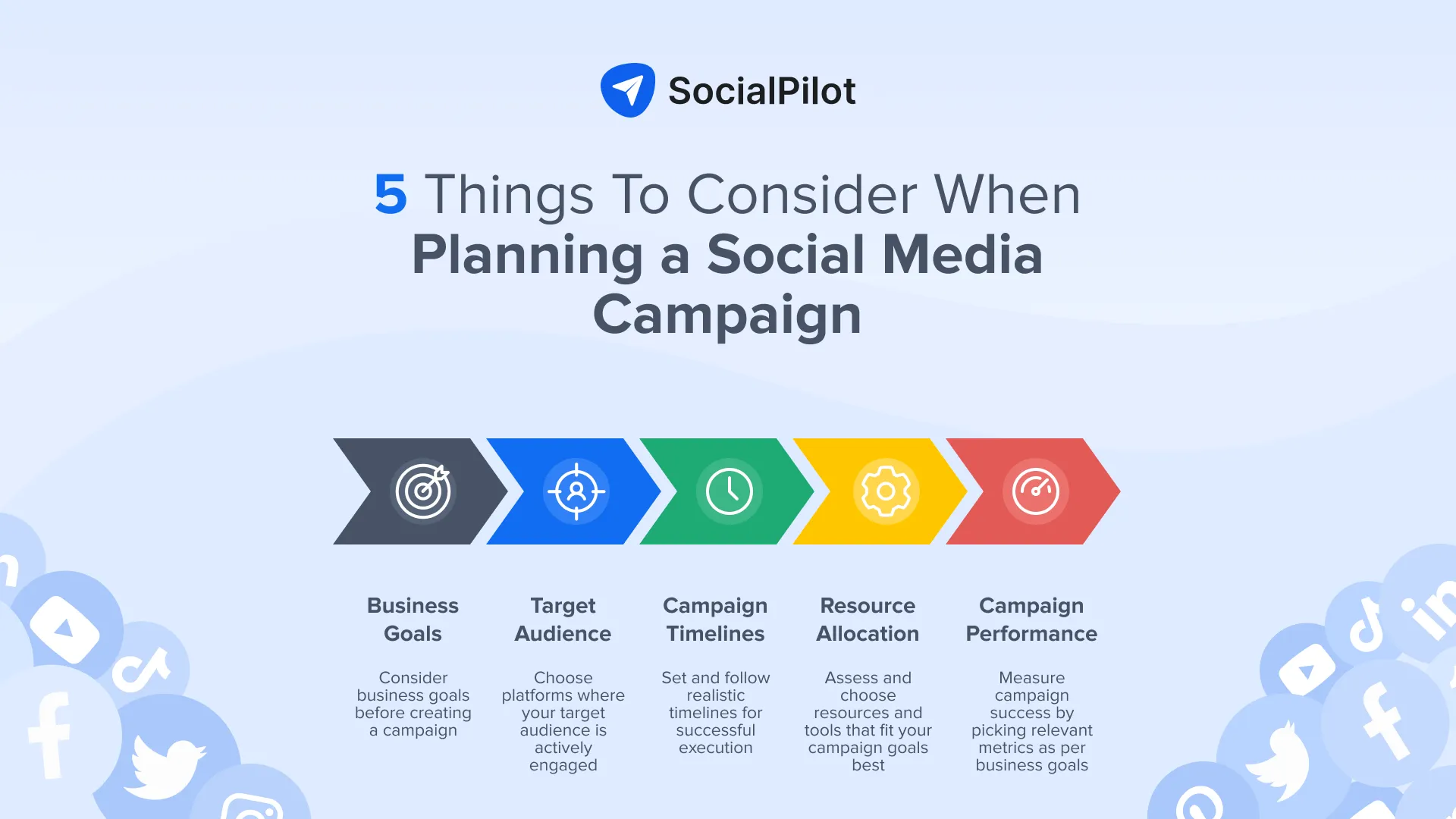
1. Align With Business Goals
Always begin by discerning the business goals of the brands you’re creating campaigns for.
Is it creating brand awareness for a newly launched product?
Do you want to increase traffic to an e-commerce store?
Or do you want to promote an upcoming offline event for more registrations?
A great example is how Slack promoted an online event with crisp copies and pleasing colors.
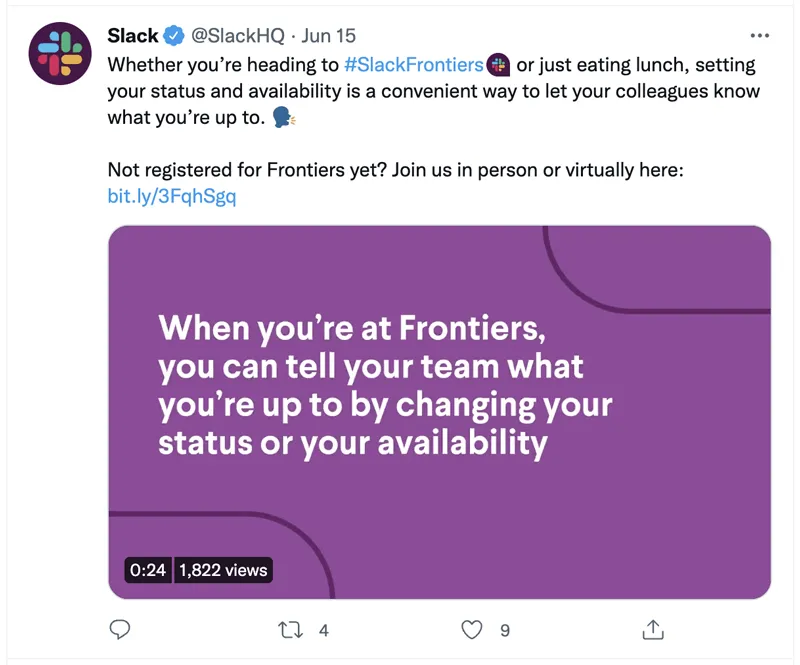
When you clearly understand your client’s business goals, you can devise more focused campaigns and choose relevant platforms to execute them.
2. Maintain Relevance to Target Audience
With the appropriate channels chosen in tandem with business goals, narrow down your social media activities based on where and when your audience is most present and active.
Different user demographics, characterized by age, interests, and buying behaviors, gravitate toward distinct social platforms. For example, the age bracket of 25-34 makes up the largest segment of Instagram users, with users over 65 being the smallest segment.
What does this mean for you?
If your brand targets teenagers and young adults, choose a different platform, like TikTok, where the majority of users are between ages 18 and 24.
3. Establish Campaign Timelines
Deciding campaign timelines is critical to social media marketing success. This includes setting a start and end date, determining timelines for specific milestones within the campaign, and setting periodic review dates to keep track of the campaign’s progress.
Such timelines gain even more significance for themed campaigns such as business promotions, sale announcements, product updates, or holiday offers.
Ultimately, it is vital to keep all your team members aligned with campaign timelines for seamless execution and delivery.
With that, we come to the next most critical element of successful social media campaign management – financial prudence.
4. Budgeting and Resource Allocation
The tools and resources at your disposal determine how effective the execution of your social media campaign will be.
Evaluate your available arsenal.
By that, we mean taking stock of the available tools and team members to ascertain if they suffice to meet the objectives and timelines you’ve set.
Periodically assess your campaign performance to determine if you need to recalibrate budgets for tools you may have invested in. This also helps identify areas you lack and need more resources for seamless campaign management.
5. Measure Campaign Performance
Define your campaign metrics that reflect the business goals your campaign was conceived to realize. Beyond mere numbers, this entails gauging the tangible impact of your campaign, from the impressions garnered to the impact on website traffic and engagement for your brand. Monitor your campaign according to these metrics to ensure you make optimal use of your budget and resources.
Keep reading to learn about the strategies marketers use for effective social media campaign management.
Strategies for Effective Social Media Campaign Management
Navigating the vast world of social media can be both exhilarating and daunting. For brands looking to leave a lasting imprint, understanding the nuances of social media campaign management is more than just a skill—it’s an art.
As we delve deeper into this realm, here are six foundational strategies to guide you, ensuring your campaigns resonate, engage, and truly stand out:
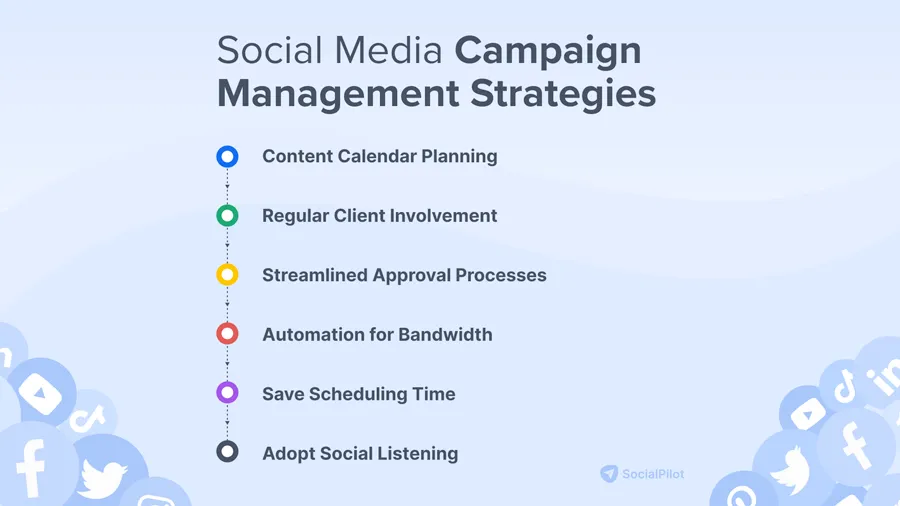
1. Plan a Content Calendar
One of the cornerstones of a successful social media campaign is consistency and planning.
A content calendar serves as a strategic roadmap, guiding brands in curating content that aligns with their overarching goals, seasonal trends, and audience preferences. Without it, brands risk sporadic posting, missed opportunities, and content that may not resonate with their audience.
With a myriad of promotional activities and campaigns running simultaneously, it’s easy to overlook crucial posting dates or events. A content calendar ensures that every piece of content has its designated slot, ensuring maximum impact and reach.
This is where tools like SocialPilot shine.
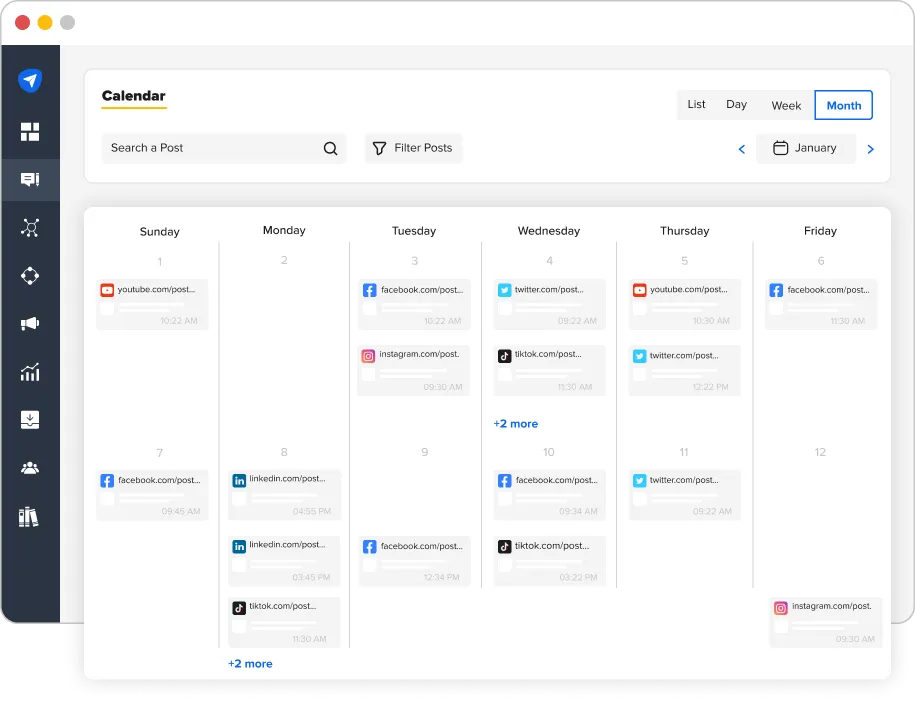
With features such as a ‘week view’ and ‘day view,’ SocialPilot provides an in-depth perspective of all your scheduled content across various platforms. By creating a comprehensive content calendar, you can seamlessly keep track of all your social media endeavors and ensure that every post aligns with your brand’s narrative.
2. Loop in Clients From the Beginning on Execution
Building on the foundation of a well-planned content calendar, the next step is to ensure that the vision aligns with the client’s expectations and insights. By involving clients from the outset, you’re not just seeking approval but fostering a collaborative environment where ideas can be exchanged, refined, and optimized.
Clients deeply understand their brand, audience, and market dynamics. Their insights can be invaluable in shaping content that truly resonates. Early involvement ensures that the content is aligned with the brand’s voice and enriched by firsthand knowledge of the target audience and market nuances.
Moreover, early feedback loops prevent last-minute revisions, ensuring the timely execution of campaigns. It’s not just about avoiding post-launch changes; it’s about crafting content that’s been vetted, refined, and optimized from the get-go.
With the aid of social media management tools, this collaborative process becomes even more streamlined, ensuring that the final campaign is a product of collective expertise and vision.
What’s next? Getting approvals, of course!
3. Set Up Approval Processes With All Stakeholders
Following the collaborative approach of involving clients in the initial stages, it’s essential to establish a structured approval process. This isn’t just a bureaucratic step; it’s a strategic move to ensure that every piece of content aligns with the agency’s vision and the client’s expectations.
Approval processes impact the content life cycle for time-sensitive social media campaigns. Having the right process can make or break the success of the timely execution of social media campaigns.
That’s not all…
When you have a clear approval process involving relevant stakeholders, both internal and external, it ensures that all deliverables are vetted from multiple perspectives. This, in turn, ensures that the final content is of high quality and aligns with the brand’s voice, audience preferences, and market dynamics.
4. Use Automation for Increased Bandwidth
With a streamlined approval process, the next logical step for an agency is to optimize the execution phase, and that’s where automation comes into play. Wherever possible, employ social media management tools to do the heavy lifting for campaign execution and management.
Instead of manually going about post-scheduling, generating analytics reports, and responding to customer queries, automation tools ensure accuracy and consistency and can save hours of time that can be used for content strategizing and planning.
What’s more?
As an agency, automation is not just about efficiency; it’s about scalability. As client portfolios grow and campaigns become more complex, automation becomes the anchor that holds everything together, ensuring the agency can deliver consistent results across the board.
5. Save Time in Scheduling Posts
While automation tools streamline various tasks, the act of scheduling posts in advance offers its own unique set of advantages.
Staying on track with a publishing schedule is more than just a logistical necessity; it’s a strategic move. You need to adopt an approach where posts are scheduled in advance.
By scheduling posts ahead of time, agencies can ensure consistency in their content delivery, a crucial factor in maintaining audience engagement and trust. Moreover, this proactive approach provides a buffer, allowing agencies the flexibility to adapt to sudden market shifts or capitalize on emerging trends—valuable in the social media space where trends change in a heartbeat.
Furthermore, with posts lined up in advance, agencies gain a comprehensive overview of their content trajectory. This bird’s eye view ensures that your content is timely, cohesive, and aligned across platforms.
6. Adopt Social Listening
Picture this.
You’re pumped up about going live with your next social media campaign for a client you spend hours ideating and creating content for. But there’s a crucial element you might be overlooking: the voice of the audience. What are current customers saying about this brand? Has anyone responded to their disgruntled comments or DMs?
Social listening goes beyond direct mentions. It’s about tuning into conversations, even if the brand isn’t directly tagged.
Customers value brands that listen and respond. By staying on top of these online discussions, you address concerns and uncover opportunities to align your campaigns more closely with audience sentiment.
Take the case of Sport Clips, a renowned hair care brand.
During the pandemic, they harnessed social listening to understand consumers’ concerns about salon cleanliness and safety. By actively monitoring these conversations, they tailored their content to reassure these concerns, building trust and authenticity around their brand.

Their success underscores the potential of social listening in shaping a brand’s social media strategy, driving engagement, and ultimately converting conversations into conversions.
How SocialPilot Can Help With Social Media Campaign Management
SocialPilot stands out as a comprehensive tool tailored for marketing agencies. Its features, such as a white-labeled dashboard, branded analytics reports, and seamless client management, position it as an essential platform for agencies focused on enhancing their social media campaign management.
Let’s quickly walk you through some features that will aid your social media campaign management.
Create a Publishing Schedule: The robust content calendar by SocialPilot allows agencies to plan and schedule their posts meticulously. By visualizing the entire publishing timeline, agencies can strategically space out content, avoid overlaps, and ensure that each post garners optimal visibility. The platform’s intuitive design ensures precision in post timing, maximizing engagement and reach for every piece of content.
Optimize Approval Workflow: Delays due to pending client approvals can hinder campaign execution. SocialPilot’s client-collaboration platform offers a solution. Direct links can be sent to clients for content review or approval, bypassing the need for additional logins or registrations. This feature streamlines the approval process, ensuring timely campaign launches.
Use Bulk Scheduling for Efficiency: SocialPilot’s Bulk Scheduling feature is a must-have for agencies juggling multiple client accounts. Instead of scheduling posts individually, agencies can upload and schedule numerous posts simultaneously. This streamlined approach reduces manual effort, ensuring that content is consistently delivered while saving significant planning hours.
Automate Report Generation: SocialPilot simplifies reporting by offering automated report generation. Agencies can effortlessly merge data from different social platforms into a comprehensive report. Additionally, the platform’s auto-send feature ensures clients consistently receive these insights, eliminating delays and enhancing client-agency communication.
What sets SocialPilot apart is its white-label solution. Agencies can customize these reports with their branding, offering a personalized touch.
Conclusion
The success of social media campaigns pivots around strong social media campaign management. Agencies who get this right outshine their peers with regard to brand awareness, audience engagement, customer acquisition, and retention, which ultimately impacts the ROI for their clients.
Plan your calendar, set clear content and approval workflows, utilize automation tools, and select relevant performance metrics to ace your social media campaign management at an agency level.
To get a hands-on experience of some of the tips shared here, get started with your free trial on SocialPilot.




